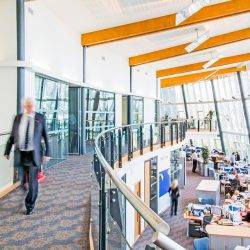April 20, 2017
Apple granted permit to trial driverless cars in California 0
 Apple has been given permission to test a range of driverless cars in California. The state’s Department of Motor Vehicles has awarded a permit for the company to start testing its self-driving car technology on public roads, ending a period of speculation about its plans for the autonomous technology. The permit covers three vehicles, which will be 2015 Lexus RX 450h hybrid SUVs, and six individual drivers. However, the plan does not seem to suggest that Apple will become a car maker any time soon and instead will focus on the development of the technology itself rather than the hardware.
Apple has been given permission to test a range of driverless cars in California. The state’s Department of Motor Vehicles has awarded a permit for the company to start testing its self-driving car technology on public roads, ending a period of speculation about its plans for the autonomous technology. The permit covers three vehicles, which will be 2015 Lexus RX 450h hybrid SUVs, and six individual drivers. However, the plan does not seem to suggest that Apple will become a car maker any time soon and instead will focus on the development of the technology itself rather than the hardware.














 London’s office workers are looking for shorter commutes, demanding more collaborative and networking opportunities while at work and better access to green space, retail, leisure and wellness; all of which could present a huge opportunity for the less congested outer London boroughs, a new report suggests. According to Savills latest London Mixed Use Development Spotlight, as employers and employees alike demand more from their workplace and their work- life balance, London’s outer boroughs could reap the benefits by providing greater flexible office space and affordable homes at a variety of price points. According to Oxford Economics, employment in sectors that tend to occupy co-working spaces is set to rise by 20,000 people in the outer London boroughs over the next five years, which equates to a gross additional need of 1.6 million sq ft (148,644 sq m) of office space.
London’s office workers are looking for shorter commutes, demanding more collaborative and networking opportunities while at work and better access to green space, retail, leisure and wellness; all of which could present a huge opportunity for the less congested outer London boroughs, a new report suggests. According to Savills latest London Mixed Use Development Spotlight, as employers and employees alike demand more from their workplace and their work- life balance, London’s outer boroughs could reap the benefits by providing greater flexible office space and affordable homes at a variety of price points. According to Oxford Economics, employment in sectors that tend to occupy co-working spaces is set to rise by 20,000 people in the outer London boroughs over the next five years, which equates to a gross additional need of 1.6 million sq ft (148,644 sq m) of office space.




 Flexible working can increase employee job satisfaction and organisational commitment, but staff who work flexibly under an ad hoc arrangement appear to perform better than those who go through a more formal process, according to research from
Flexible working can increase employee job satisfaction and organisational commitment, but staff who work flexibly under an ad hoc arrangement appear to perform better than those who go through a more formal process, according to research from 













March 30, 2017
Social technology has the power to make the workplace more humane
by Amanda Sterling • Comment, Technology, Workplace
More →